The Minister of the Presidency, Félix Bolaños, this Monday, after the Council of Ministers. Jesús Hellín (Europa Press)
The Third Chamber (Contentious-Administrative) of the Supreme Court will have the last word when deciding whether the Government is obliged to deliver a secret document to a judge or an individual, according to the Draft Law on Classified Information, which last Monday approved by the Council of Ministers and to which EL PAÍS has had access.
"Any person directly affected by its content or who proves a right or legitimate interest may file an appeal before the Contentious-Administrative Chamber of the Supreme Court" against the diligence or directive that classifies information as top secret, secret, confidential or restricted. , points out article 37 of the preliminary draft.
An additional provision of the same modifies the regulatory law of the Contentious-Administrative Jurisdiction to detail the procedure: the appeal must be filed within two months from the knowledge of the existence of the classification (the problem is that it is not reported the matters being classified).
During the procedure, if it deems it necessary, the Chamber “may order that the [secret] information be sent to it for examination, without the presence of the parties,
keeping absolute reserve”;
and, finally, it will issue a ruling, which may be dismissed and keep the information classified or, on the contrary, upheld "annulling the agreed classification", unless it considers that there are formal defects that can be corrected that it will order to fix.
More information
Editorial.
'New law of secrets'
Judges must also go to the Contentious-Administrative Chamber of the Supreme (and not directly to the Government as now) if, during the investigation of a case, they consider "access to classified information essential for the development of the proceedings."
If the Chamber admits the request, it will be addressed to the classification authority which, within 60 days, will send the information or a report justifying the reason why it does not do so.
Also in this case, the magistrates of the Supreme Court may request access to the secret document for examination, before deciding, "weighing the conflicting interests, the total or partial referral, or the non-referral of the information to the requesting judicial body."
Here are other highlights of the Classified Information Bill:
What can be secret?
Classified information is considered to be all that "whose unauthorized disclosure or improper use may cause damage or endanger national security or defense."
How many secret categories are there?
Four: Top Secret, Secret, Confidential, and Restricted.
What can be classified as top secret?
All information whose unauthorized disclosure or improper use may give rise to an "extremely serious" threat or damage to sovereignty and territorial integrity;
constitutional order and state security;
national security;
national defense;
public safety and the lives of citizens;
the capacity or security of the Armed Forces of Spain or its allies, or of the Security Forces and Bodies;
the effectiveness or security of the missions and operations of the intelligence or information services of Spain or its allies, or of the Security Forces and Bodies;
Spain's foreign relations or situations of international tension;
economic or industrial interests of a strategic nature and “any other area whose safeguard requires the highest protection”.
universal confidentiality.
The definition of information that can be classified as confidential or restricted is so broad that it is practically universal.
Any information that may cause a "slight threat or harm" or be "contrary to the interests of Spain" in any of the following fields will be confidential: the effective development of State policies or the operation of the public sector;
the political or commercial negotiations of Spain with other states;
economic or industrial interests;
the operation of public services;
the prevention, detection and investigation of crimes;
in addition to "any other area that may cause a threat or slight damage to the interests of Spain".
Who can qualify?
Only the Council of Ministers can classify, reclassify and declassify information as secret or top secret, although a matter can also be classified directly by law, as is the case with the sources and means of the National Intelligence Center.
Instead, a long list of authorities can be classified as confidential and restricted: the president, vice presidents, ministers, secretaries of state, undersecretaries, the Chief of the Defense Staff and the heads of the armies, the director of the secret service CNI, the ambassadors and consuls, the president of the Nuclear Security Council, delegates and sub-delegates of the Government, directors of the Department of National Security, the Police and the Civil Guard and the secretary of Penitentiary Institutions.
Also,
the competence to classify confidential and restricted information is recognized to “the competent police authorities of those autonomous communities” with their own police forces, such as Catalonia, the Basque Country and Navarra.
The competence to classify as secret and top secret cannot be delegated, but not those of confidential and restricted.
Expiration of the classification.
Information classified as top secret will be automatically declassified after 50 years, but it may be “extended exceptionally and motivated for another 15 years”.
Secret information will be declassified after 40 years, and may be extended for another 10 years.
The confidential will be declassified within the period set within a range of between seven and 10 years.
The restricted will be declassified after four to six years.
The terms of the confidential and restricted are non-extendable.
The declassification will be made “on the last day of the year in which the term expires”.
A certain, future and foreseeable event (such as a death or the end of a conflict) may also be set as a declassification deadline, within the established deadlines.
The information may be reclassified,
What about the secrets prior to the new law?
The preliminary draft does not contemplate an automatic declassification of all classified documents from the entry into force of the law still in force, in 1968, until the new one does so, foreseeably in 2023, even though the maximum 65 years foreseen for senior citizens have elapsed. secrets
It only provides that the authorities with competence to declassify initiate the procedure “ex officio” (but are not obliged to do so) or “at the reasoned request of the person directly affected”.
In the latter case, applicants must do so "indicating their interest in the information required, the reasons that justify the requested declassification and identifying in detail the information that is to be declassified."
Destruction and archive
.
The declassified documents will be made available to the Archives Commission of the General State Administration, which will determine their usefulness or obsolescence in historical terms.
All draft classified documents "must be destroyed as soon as possible."
The law makes two exceptions: "it will not be necessary to destroy those materials related to matters on which there are judicial or fiscal proceedings in progress," it states, leaving open the possibility that they will be destroyed or not.
Instead, it expressly prohibits destroying information used "to prosecute human rights violations or crimes against humanity."
parliamentary access.
The Congress of Deputies will access the classified information "through" the Commission for the Control of Reserved Funds, of which a deputy from each parliamentary group forms part.
Fines for publishing secrets.
“Any natural or legal person who, without the need to know, has access by any means to classified information must keep absolute confidentiality about its content and will not disclose or make it public,” says article 33 of the draft.
A complete title of the law is dedicated to detailing a harsh sanctioning regime that punishes very serious infractions with fines of one to three million euros;
with 50,000 euros to one million serious;
and with up to 50,000 euros for minor ones.
It is a very serious offense "the dissemination, by any means, of information classified as secret or top secret";
while the dissemination of confidential information is considered a serious offense;
and mild, that of restricted information.
As the law is written, these sanctions can be applied to journalists and media outlets.
The Government assures that constitutional jurisprudence imposes the pre-eminence of the right to information, but it is something that, if necessary, should be resolved by the instructor of the sanctioning file or the judge hearing the corresponding appeal.
It is also considered a very serious offense to access without permission or facilitate access to secret or top secret information to an unauthorized person;
as well as delivering secret information to foreign powers when there is no exchange treaty, among other behaviors.
In addition to the fines, the prohibition to contract with the public sector for up to six years in very serious infractions and three in serious ones are included as sanctions.
Authorities and public officials who commit a very serious infraction can be punished with suspension from service and labor personnel with disciplinary dismissal.
In the case of serious infractions, the suspension of functions or employment and salary can last six years.
international secrets.
All classified information that Spain receives from other states or international organizations will be classified with a category equivalent to or higher than that of origin.
The Ministry of the Presidency, guardian of secrets.
The National Authority for the Protection of Classified Information —which until now was in the CNI and is transferred to the Ministry of the Presidency, Relations with the Courts and Democratic Memory— will be in charge of protecting and treating information classified as top secret, secret and confidential, as well as that which Spain receives from other states or international organisations.
Its functions include granting, denying, suspending and withdrawing the Personal Security Authorization (HPS) that allows access to this information.
To grant it, it will carry out a "security control" of the applicants that will evaluate their vulnerabilities.
Only the President of the Government, for all classified information, and the authorities with the capacity to classify, for the categories of confidential or restricted in their area of competence,
are exempt from obtaining this authorization.
The Presidency will also grant security clearances for companies that work with classified information or establishments where it is handled.
Read the draft of the draft of the Classified Information Law.
If you can't see it, click here.
50% off
Subscribe to continue reading
read without limits
Keep reading
I'm already a subscriber

/cloudfront-eu-central-1.images.arcpublishing.com/prisa/MXMBQDTO2UEHZXGLMBODIQDPZY.jpg)
/cloudfront-eu-central-1.images.arcpublishing.com/prisa/D3576S7FQR7WMDOXMD6W5KYIYY.jpg)




/cloudfront-eu-central-1.images.arcpublishing.com/prisa/VOT7MD2S4VGTBN4VUOZKAZMCQY.jpg)




/cloudfront-eu-central-1.images.arcpublishing.com/prisa/KMEYMJKESBAZBE4MRBAM4TGHIQ.jpg)


